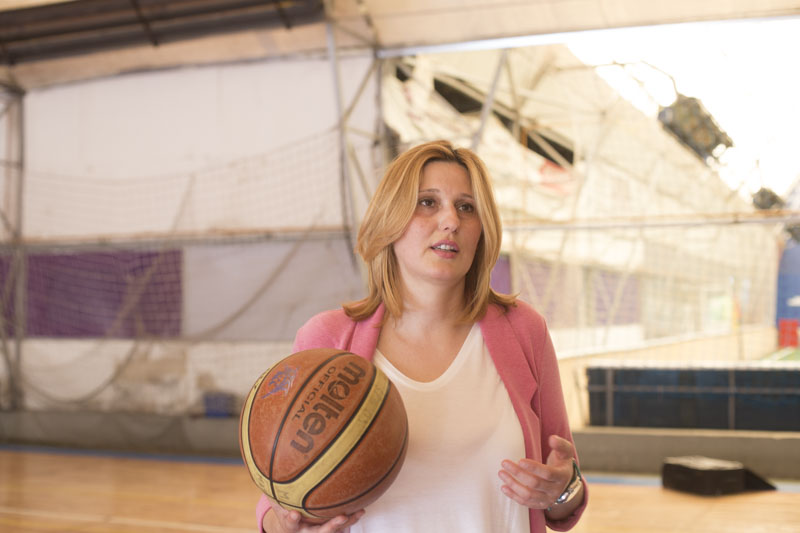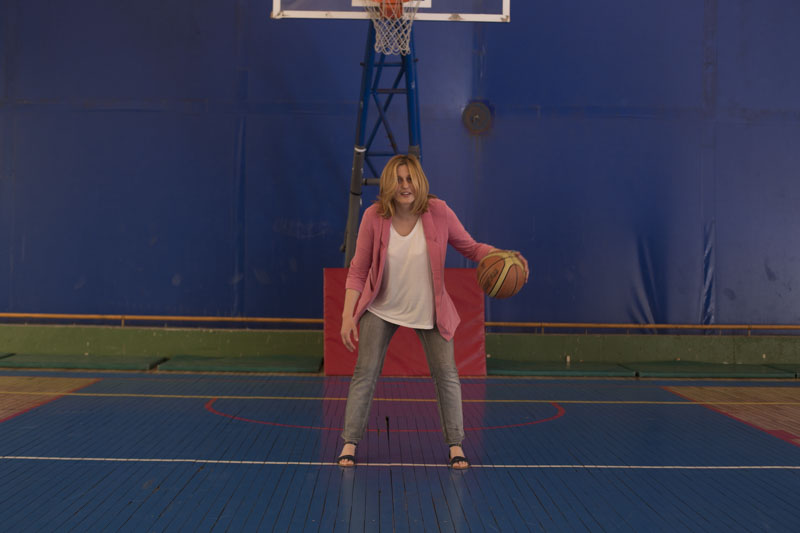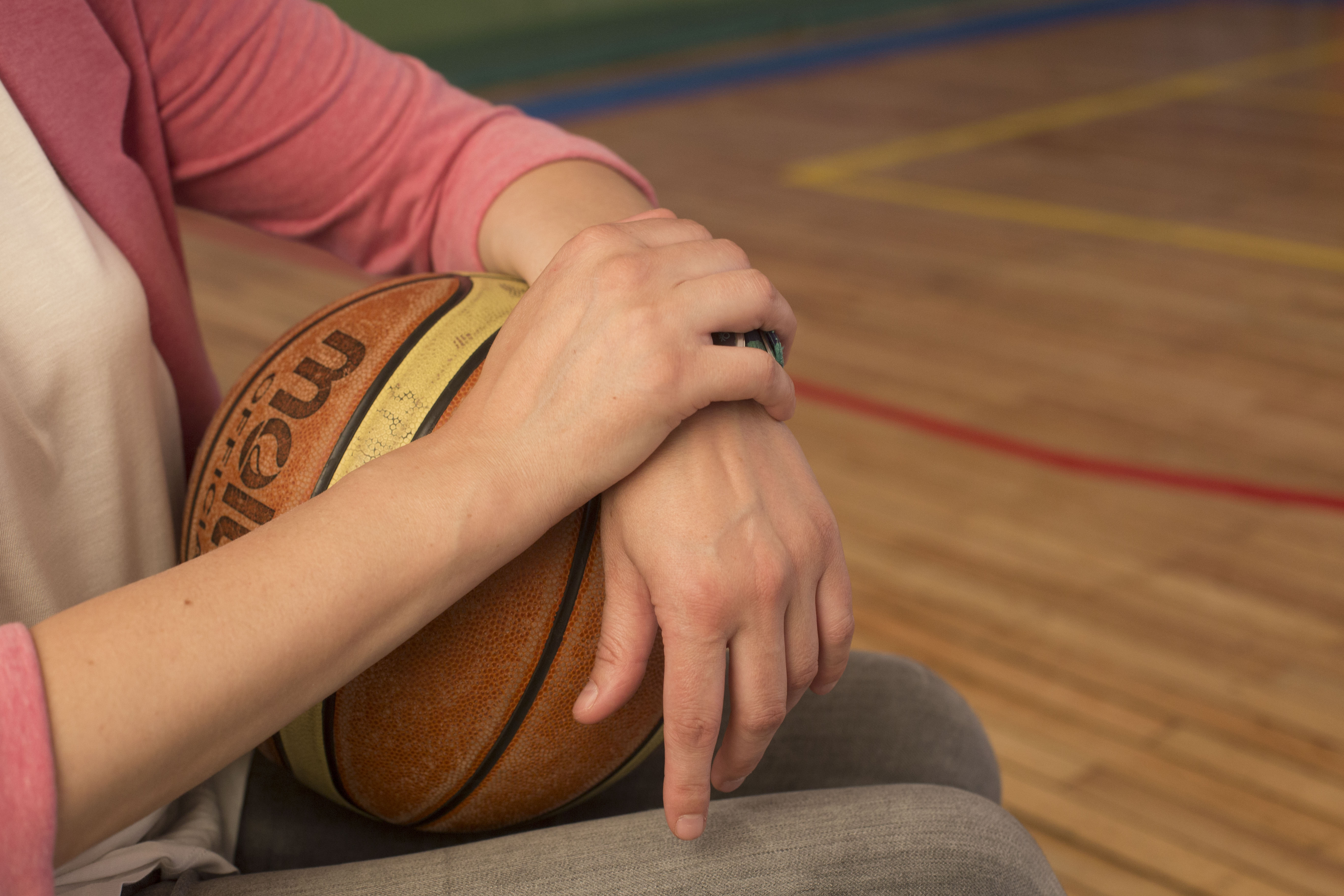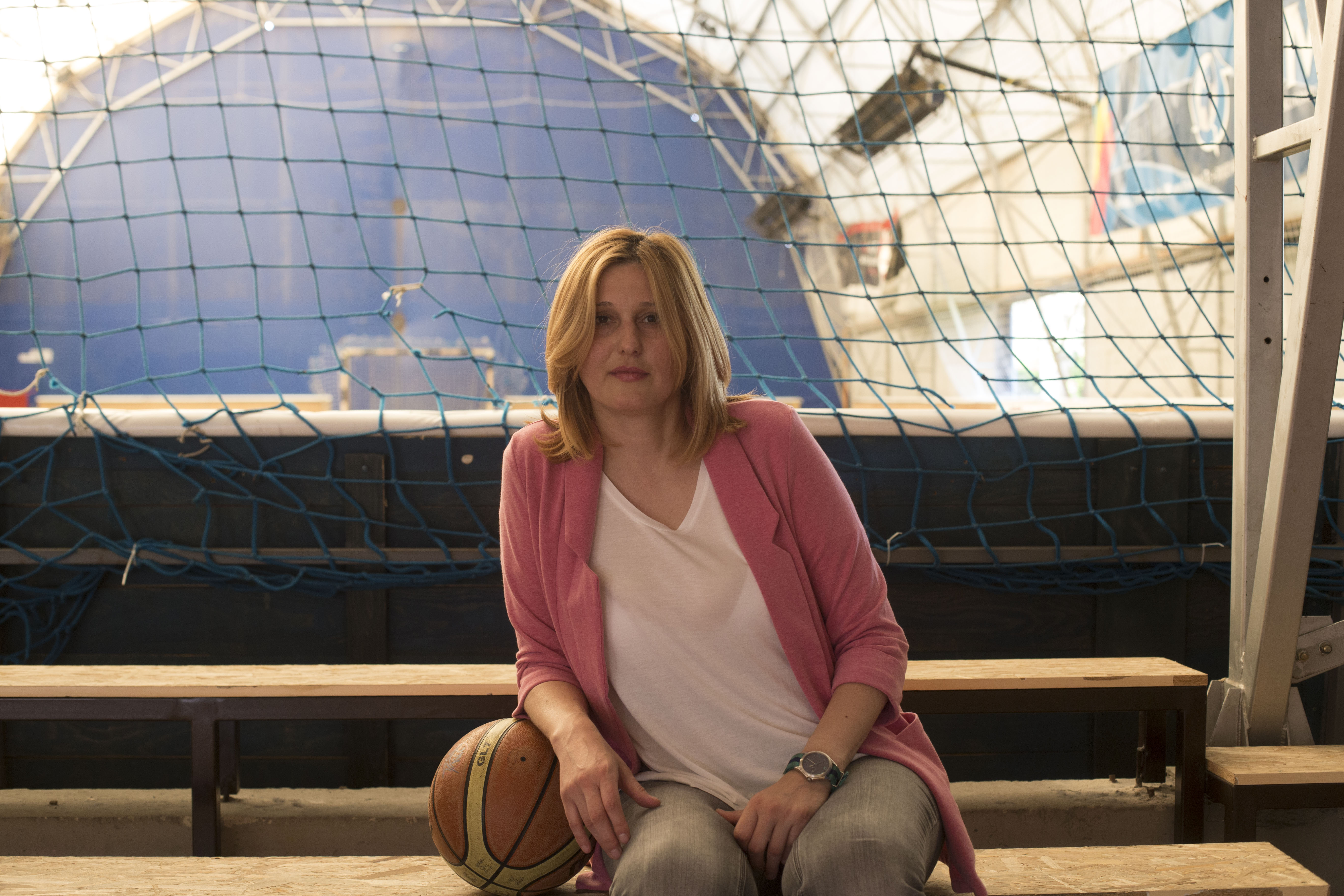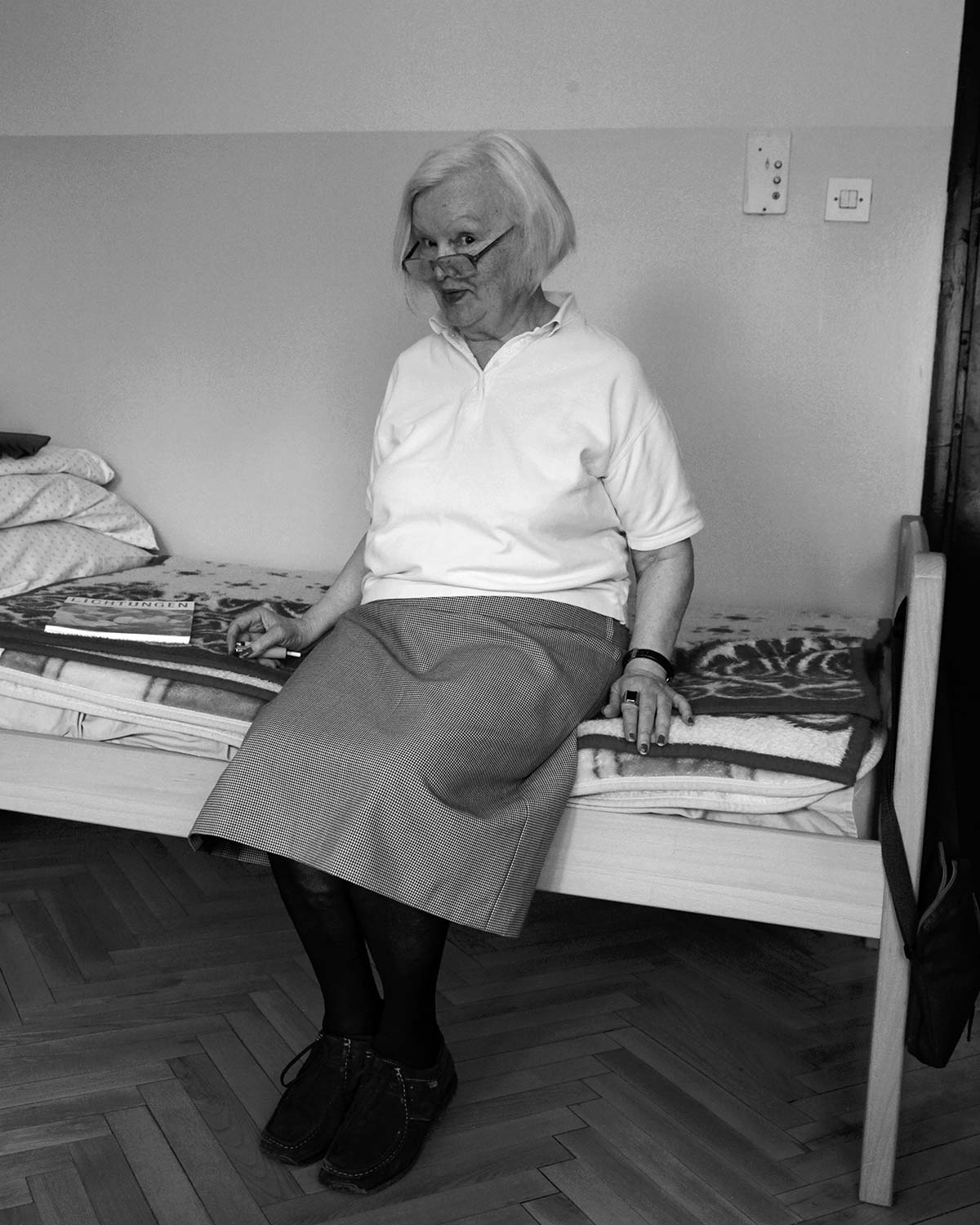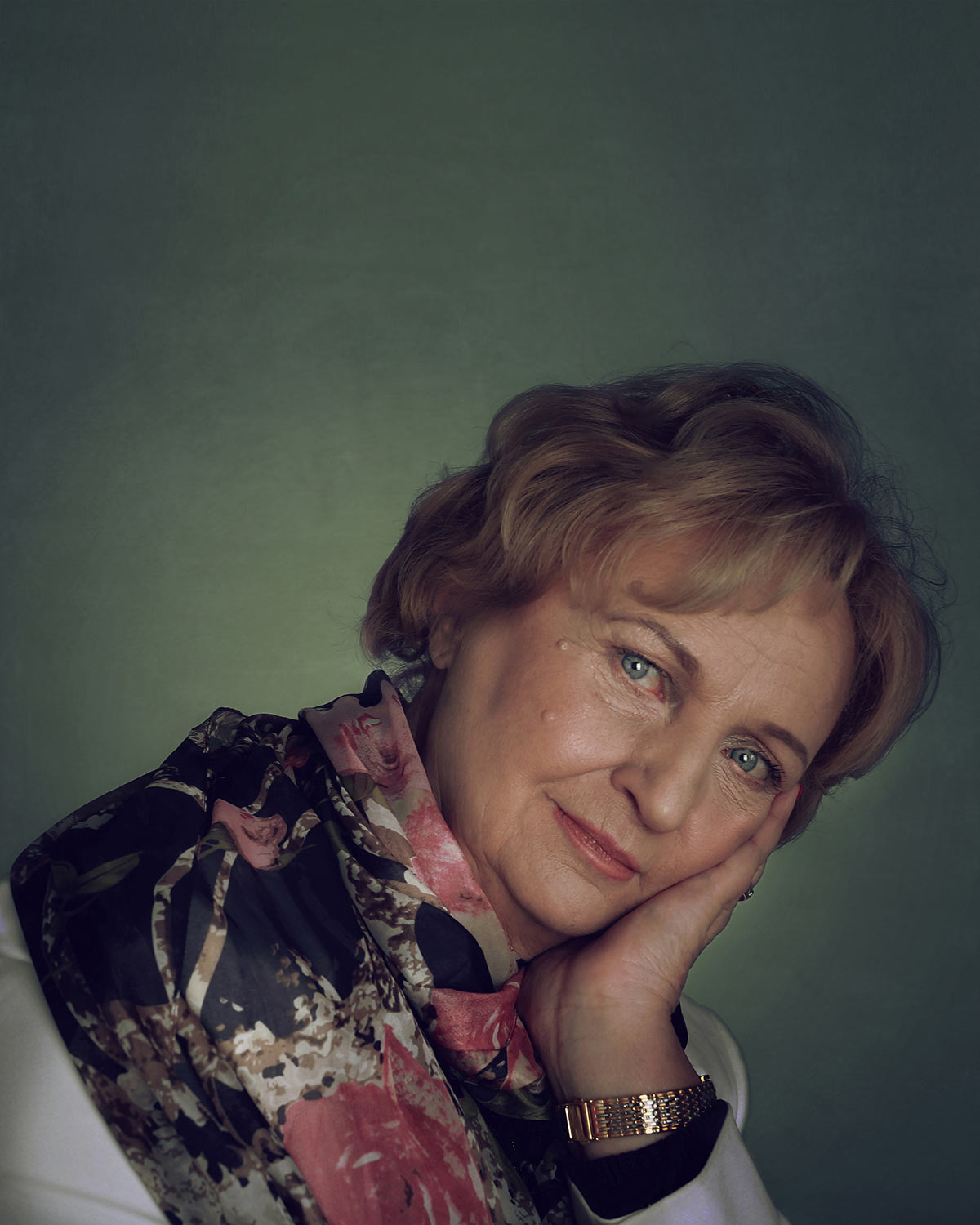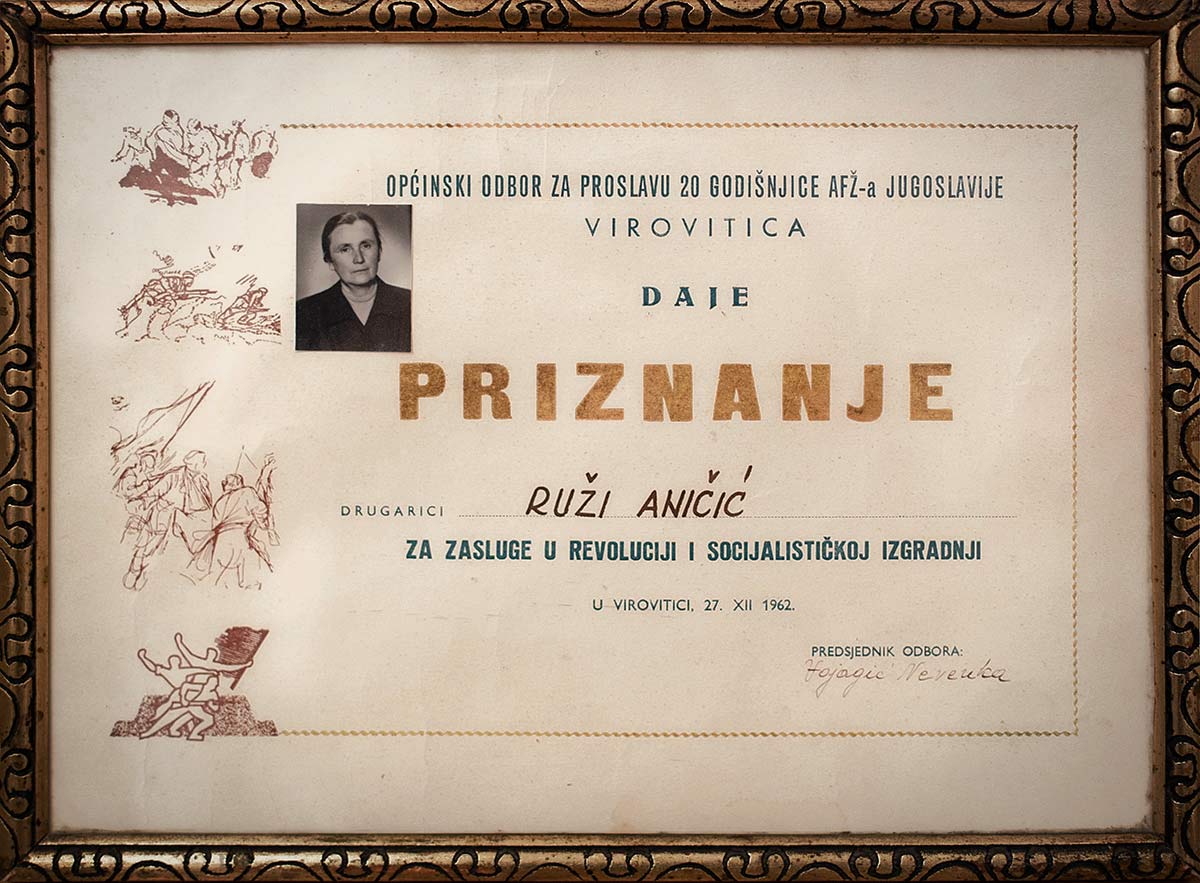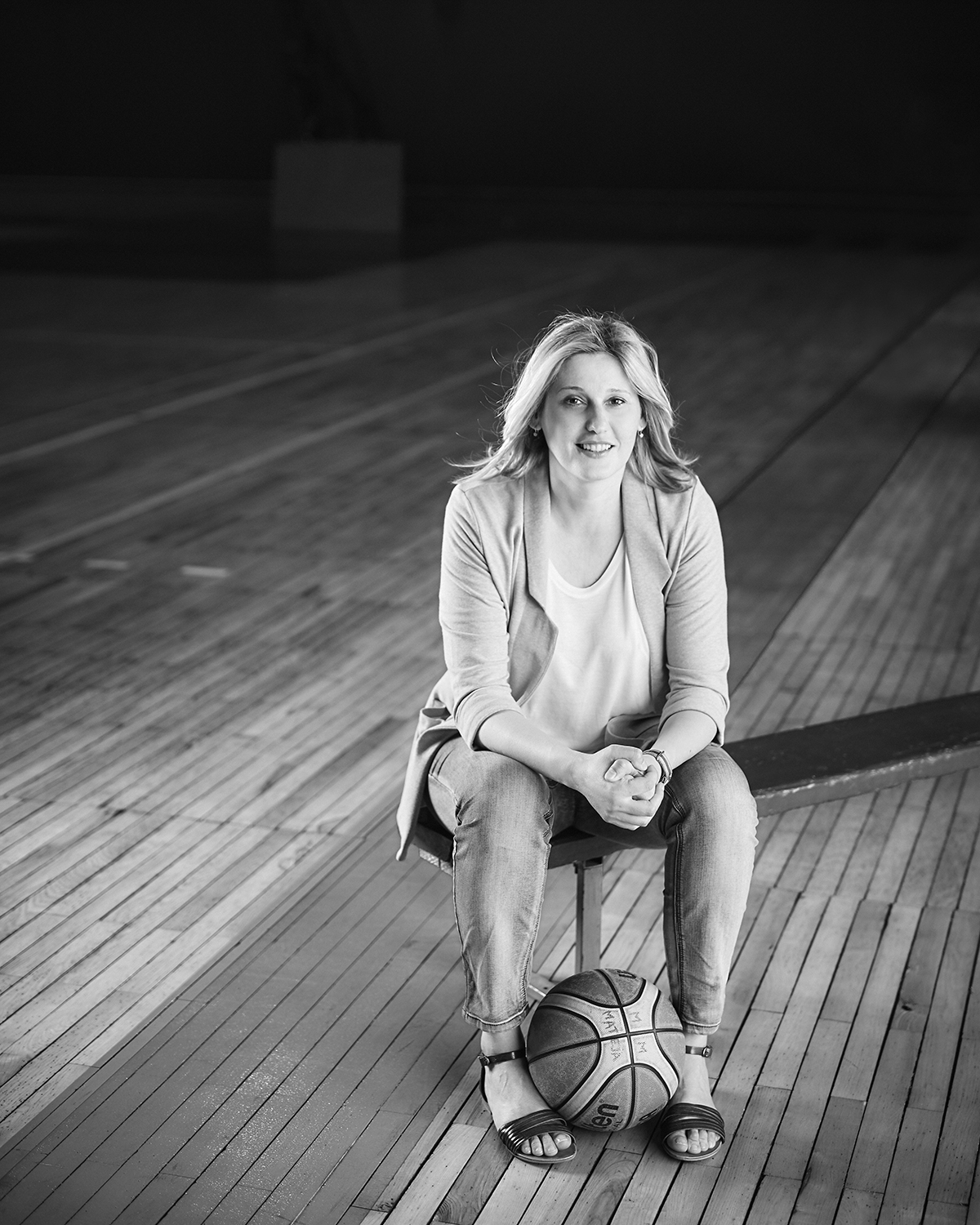
MILICA magazine dedicates this CITATION and the Ruža Order to
Dejana Cvjetan
For fair play, a healthy spirit, dedication and a desire to win
When the national anthem plays, the flag is unrolled and the medal start to shine, every sports commentator concludes that Serbia is a nation of sports, and proudly goes over all of our victories.
What makes us a sports nation? Our golden boys, Novak Djokovic, Monika Seles, our old glory? The way we identify with our heroes on the field? We beat the Americans, defended the title, we’re the best?
Is this why every child’s dream here is to be a champion? Who are the champions of our nation: the kids kicking a ball in their backyard, or the heroes on the throne?
We found an answer to that question in a young and vibrant sports story dedicated to girls, their creativity, life, happiness, and success.
MILICA magazine dedicates this CITATION and the Ruža Order to Dejana Cvejtan, a basketball player and founder of the Women’s Basketball Academy in Novi Sad. The story we chose has all the elements needed to take you to all the way to the throne: fair play, healthy spirit, dedication and a desire. In sports and life in general. Dejana serves as proof that it’s all possible.
While she talks, Dejana keeps smiling a honest, rebellious, victorious smile. A tapping basketball gives rhythm to our conversation.
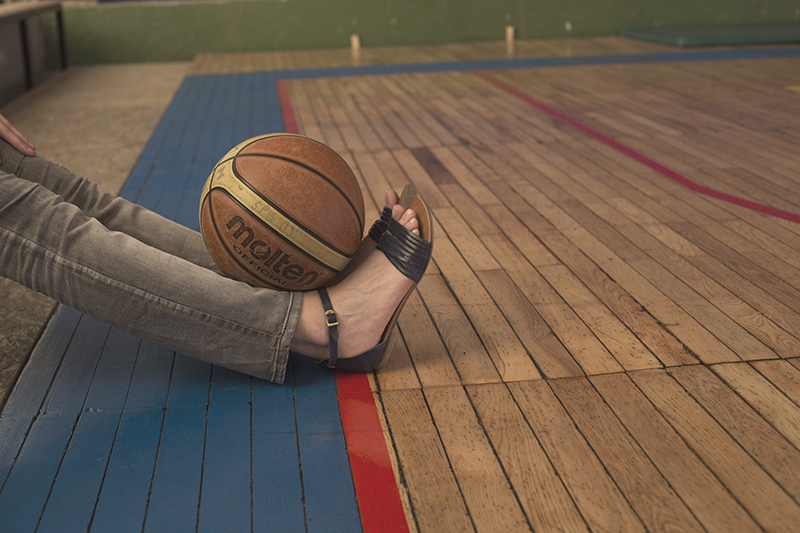
Where did it all begin?
I remember the exact moment. I remember stepping onto the court. I stood on the green linoleum floor and thought: this is it.
Before I started playing basketball I did athletics, and then gymnastics for my back. I played tennis, too. My aunt used to take me, it was popular at the time. Monika Seles was my next door neighbor, i used to run into her every morning. But the coach would yell and I got very scared. I came home and told my parents I don’t want to go anymore. Then my uncle ask if I wanted to give basketball a try- his friend was a coach at my school.
At the end of the 80’s, Dejana and her team won national championships, wore Adidas Top Ten’s, number 3 on her uniform like Sasa Danilovic, became quite popular among her peers. Basketball was all she was into.
Because it suited me, my character, I love being with people, communicating, playing. Basketball gave me that opportunity- to play, have fun, outwit. There’s that famous question- do you like winning, or being right? I think the desirable answer is being right, but I really like to win!
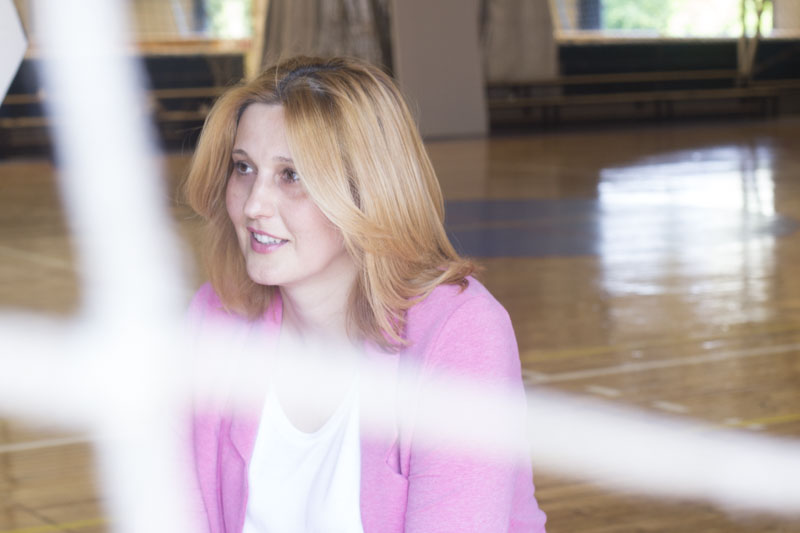
Kids then and now
Our generation was much more creative. We used to play cops and robbers, dodgeball, jump rope and talk amongst ourselves, we showed emotion.
I notice ids today are not creative. Does it have to do with how they grew up? I think so. They look like robots. It takes so much time to bring some creativity out of them! It’s like they don’t know how to have fun, laugh…. Everything’s a drag, they don’t want to, they can’t…
Why do they take up basketball?
Parents tend to think that, besides mandatory English lessons, piano classes and such, they should have some physical activity too. Although there are kids who really wanted to play basketball. They used to do dance or volleyball and didn’t like it, so they wanted to give this a try. My son didn’t want to play basketball and I never forced him. It’s good for kids to start off with various sports- he went swimming, running, even played football for a while. But then one summer, I would take him to practice, because I didn’t have a babysitter. And after a while he asked me if he could play too. He’s very talented, and a lot like me. I get chills when I notice he’s exactly the way I was when I was a kid. Basketball is all he cares about, and it was like that for me too. My interest for other things only showed up when I gave birth to Mateja.
And then some of those children turn this extra-curricular activity into a professional career. Dejana did, too.
You do what you love and get paid for it! You have six or ten-month contracts. I played professionally since I was 21, up until I was 27. What that means is you give up everything else and just play basketball. When I played for Vojvodina, when I was still in high-school, I got a scholarship. We would get money for playing very early on. Imagine, getting paid in high-school! It was a nice amount of money. I could help out my parents, since it was a tough time them. I became independent very early.
This might not be good to mention but I did not like working, I liked playing basketball and could not be made to do anything that didn’t have to do with the game itself- running, working out, things like that. I was quite rebellious in that sense (laughs)
This part of my personality is what stopped me from having a top-notch professional career, which does require doing things you don’t enjoy. I found it redundant..
I didn’t have anyone to give me advice and that’s why now, when I see a talented girl that complains about doing work that’s not directly related to the game- like I once did- I tell them why, I explain, and I push them forward. I didn’t have a coach who was involved, in that sense. My parents didn’t know much about basketball- they only came to see me play for the First Legue. Parents are more involved now, they participate in their children’s lives more, which I think is good.
Sarajevo and its people
A friend I used to play with has this wonderful love story for the war. They live together in Bosnia now. She went before me and used to call and say: Come play here! Sarajevo used to get lots of donations at the time and they placed importance on diversity. The director was Muslim, the president of the club Croat, the lawyer Montenegrin, the coach a Serbian Croat- it was all very multiethnic. I came for a week to see how it was. I came by car with my husband. And it was great the girls were amazing, very welcoming. I was on TV, the radio, the papers- all the time. We won champion titles, and I was great there. They were all so funny, I laughed the entire year, the practices were great, we had everything we needed. The late Mirza Delibasic used to come, and Davorin Popovic taught me how to do some moves. This old crew was there then, and there was no fooling around with them.
After a year with these people I became completely different with other people. I had no more prejudice- until you sit down with someone, talk with them, have a coffee, you can’t know anything about them.
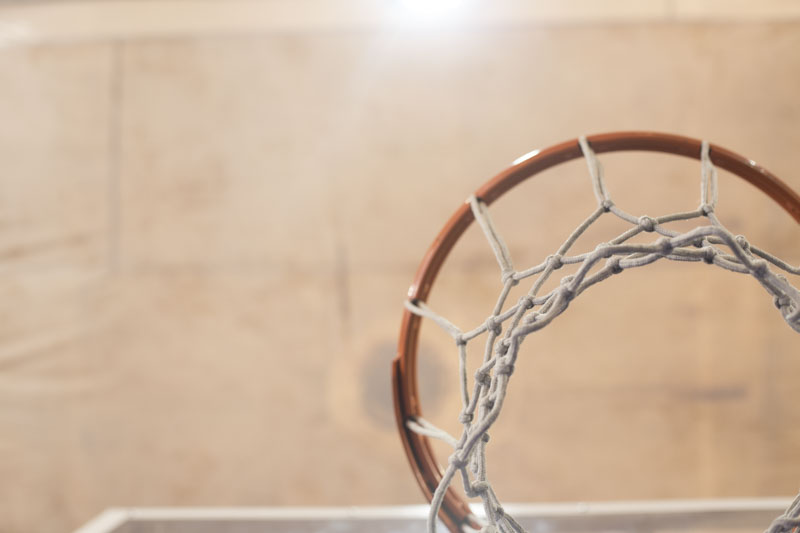
They called her Ceca (Tzetza, with a short, emphasized “e”), she became a popular city girl, and sports victories started lining up…
I was never like, I’m a popular basketball player… I didn’t think that way. I always think how I could have been five a lot better, and I feel like I missed a lot of opportunities. I was brought up in a way that everything good was sort of implied. I didn’t know how to celebrate the success. And everything wrong I did was hugely intensified. I’m very self-critical and I’m critical of others, too. I’m like that with my sons, and with the girls in the club. I teach them to always raise the bar and aim for more. Even now, I don’t have much ambition to become a famous coach. My ambition is to build a good, stable basketball club that kids will be satisfied with.
Ceca talks about the end of her professional career like an actor talks about finishing a play
Basketball was like another reality, where everything is possible, you’re the star, you always get another chance. Then there’s the traveling, the hotels, the victories, medals, money…. A player’s career ends when they’re still young, and they’re faced with the question: what now?
My career was over by the time I was 28 and gave birth to Mateja, and I asked myself if I was going to keep playing basketball. I had to figure out what to do with my injured knee. The doctor told me that if I wanted to continue playing professionally, I would have to get surgery. I was leaving the maternity ward and thinking: six months of recovery, plus getting back in shape..I’ll be 30! Who’s going to want to buy a 30 year old basketball player with fractured ligaments? It was time to get a job. My sister-in-law came to help me write a resume and asked me about my skills, I said “I don’t have any. I can only play basketball”. Plus I had a kid, I finished high-school, got into a sports college but never finished it..what could I do? We wrote down my basketball biography and started looking for jobs. An insurance company called Delta were looking for agents. When I played abroad I realized insurance was a great thing to have. We were just starting to get insurance companies here, so I applied and they called me in for an interview. It was important to them that you knew lots of people, and since I was an athlete obviously did. It was very important for me to start working: I was married, wasn’t playing basketball anymore, didn’t contribute financially, I was already getting criticized about it. I realized I’d end up on the street if I didn’t do something. I turned over a new page and moved forward. My child made me change. I started from scratch. I had serious training in Delta and it suited me. I learned a lot about sales, and sports helped me. The manaager said as soon as she read that I was an athlete she knew they had to hire me, because athletes are great at adapting. So I applied all my knowledge from sports. I started off as an agent, I was permanently employed after six months and ended up being the best agent in Vojvodina after a year. A year and a half later I was a manager, in charge of recruiting my own team- just like in basketball. I had a ten person team I was in charge of. But the company was sold and started downsizing and I was supposed to fire ten people, which I found very hard to do.
In the mean time, the Vojvodina basketball club invited me to join their Board of Directors. I was invited as an ex-player and team captain. I came with my heart set on raising women’s basketball. But I realized people knew so little about it, and I was nothing more than decoration there. I saw nothing would change, and I left. Then I told Ljubica Drljaca, who was playing in Spain at the time, and my godmother- who was also a basketball player- Selena Pavlovic:
Hey, lets open our own club!
I told them about how my friends keep calling, saying: hey, I have a daughter, where can she take basketball lessons? And I always had to say: there’s nowhere to take her, she can only play with boys. There’s no women’s basketball club. I kept persuading Ljubica and Selena for months : lets do it together, I can’t do it alone. I was never a coach before, and Selena was- although she worked with boys, and that was a different story altogether..
So we did it, the three of us opened a club: three women from Novi Sad started their own club. We made flyers, Ljubica lent us 300 euros to make the first jerseys.We wrote: now enrolling girls aged 7 to 15. We very literally started from nothing.
I quit my job at Delta in June, and in July we finished all the paperwork for the club and started working in September. I think that was a very brave thing to do: I had a child, I was divorced, and everything was very uncertain. But I wasn’t scared. I believed in it very much: I was certain there were a hundred girls in this city who wanted to play basketball. We just needed to go through with it. That’s what being an agent in Delta taught me, to be persistent: behind a “no”, there’s always a “yes”.
So when anyone, even the girls I coach, start saying: I can’t, I don’t want to…I don’t tolerate that. Everyone used to say: it’s going to be hard, you’ll have to go through politics…No, no we don’t, why would we? The only thing we need to do is be patient and fight, as women, for women’s sport. Success will come.
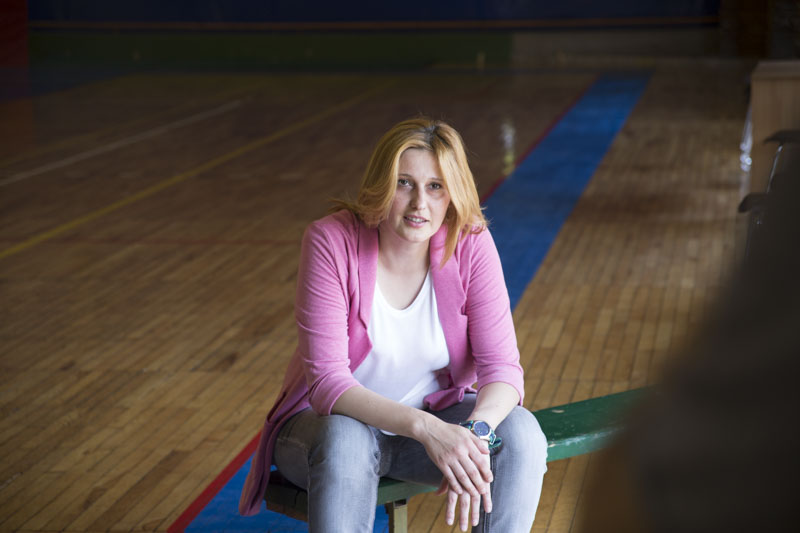
A husband and children, a house, a career
It was a sports marriage: my husband was a handball player. We did our best to play in the same cities, or close by. When we separated we functioned like a company would: we were together but we grew apart. When I had my son I realized that wasn’t how I wanted to live. I enrolled into college. I realized I was missing proper education for my job so I told myself I’ll study economy. I felt I needed it to make progress at work. So three years after I quit, I kept going to college. Everyone said it’s easy to cheat there, but I didn’t, I studied and I graduated. I did it, in part, for my son, so nobody could taunt him about his mom not going to college, but mostly for myself, because I realized it was what I was missing.
The birth of my son was a turning point. I became more afraid. , I realized I was responsible for creating a path for him. It was up to me, not politics or someone else- it was all on me. So I worked on myself. I decided I did not want to take part in a marriage I wasn’t satisfied with. Because if I wasn’t happy, he wouldn’t be either. i had no problem§ being alone. Sports make you tough (laughs)
The first accomplishments of the Novi Sad Women’s Basketball Academy
I used everything I learned in college about marketing- how to be more visible, how to attract people. We were very active on social media, we made billboards, flyers….Our main message was that we do serious work. Our competition was volleyball and dance, and the goal was to get more girls interested in trying out basketball.
We were lucky that at the time, our women’s basketball league was doing really good, so little girls and their parents paid attention to it. It was the wave we rose on. We got on that wave. Four years later, we won the Serbian national championship, in the pioneer category. That was a great generation of players, in which we had Jelena Mitrovic, who is probably the most prospective child in whole of Europe.
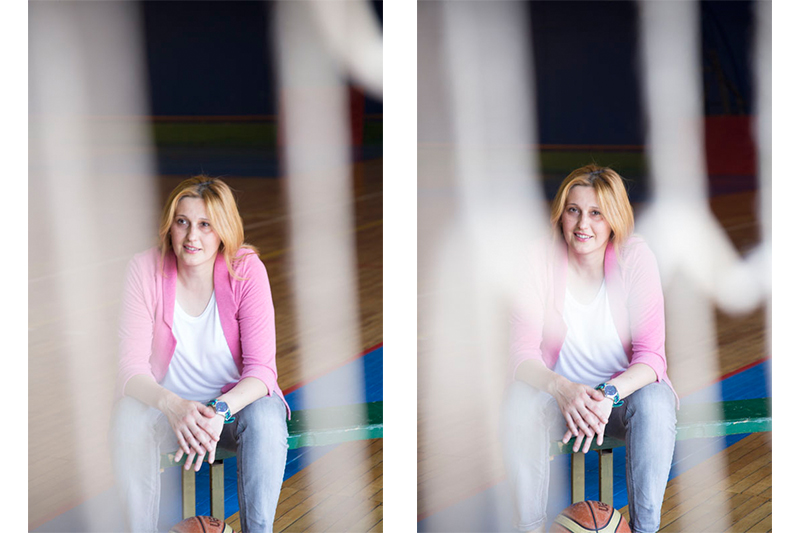
After that first big success we thought about expanding and creating a senior team. We realized, after just a year, that by working really hard we could even make it to the Serbian First League. But we needed more experienced players. We invited our former teammates, our good friends: Danijela Varda, Slobodanka Tuvić, Snežana Stepanović Vasić. We asked if they would help these kids get to the First League and they all came, for the sake of friendship, sand helped us out. They weren’t paid for it, it was pure female solidarity.
They recognized that what we were doing was important and joined it. Our concept was getting women who were professional players back in the game- women who had the most knowledge and experience and could pass it on. But also friendship, tolerance, fair play, discipline and lots of work…
The motto of our club:
We work like miners, listen like soldiers and act like princesses.
It’s what our coach Rad Geber Ladislav used to say. Some basic rules need to be respected, and those are respect among players, listening to the coach and knowing and respecting the hierarchy in place. The ones who can’t abide to that fall through. The ones who remain are the ones who can persist in doing what’s asked, because every year the bar is raised.
It’s all about their mentality and education. And obviously- not every girls is the same- some girls are delicate and don’t respond well to raised voices and such, while others are stubborn and need to be put under pressure in order to be even better.
Dejana is the founder and president of the club, as well as a trainer for younger teams.
The younger teams need to be animated. The first step is to get them to fall in love with the sport.
Why basketball? How do you convince little girls that basketball is the best sport in the world?
It’s sort of a click you make in direct contact with the children. There’s this one little girls, who was the last to join us: her older sister plays basketball here so her dad brings her along to the practice, and she does rhythmic gymnastics so she’s all jumpy and full of energy. I always included her in the practice, she would be my assistant. Until one day she decided she wanted to play basketball and asked me if she could join. There she is now, she’s a natural?
A natural?
No, not in the sense that she’s physically predetermined for it. She has a sort of energy, a character. A sort of sports intelligence. When I see a child on the court, in relation to other children, the space, I can see if they’re good for it or not. As my coach, the aforementioned Geber, used to say: give me five minutes to observe a child on the court and I’ll tell you what their personality is like.
A second son, a new strength
My older son would complain about wanting a brother, and I kept explaining he can’t, mom doesn’t even have a boyfriend. But then a boyfriend happened- I was 37 when I fell in love with Dusan’s father, and he had absolutely nothing to do with sports. I was just about to go on a trip when a friend kept urging me to go out with her, so I did, I went out in my flip-flops and shorts! And that’s the night I met Vlada. And bam- I was in love. So Dusan was born. In the meantime, Vlada had to go wok in Moscow so we separated. But we’re still on good terms. He couldn’t understand my enthusiasm, my desire to work even when there’s no money involved. He was all business. Since he never did sports, it was hard for me to explain this pure enthusiasm and love I had for basketball, and the complete faith I had in the fact that one day it will also enable me to earn a decent living.
Is the club your only source of income?
I also own a private company that makes silicone baby bibs. I received one as gift for Dusan from America and I was delighted. Then I realized you couldn’t buy them here and thought that maybe I could make them. My husband gave me some money and I had them made to my ideas and drawings. The brand is called Family Gang, but I’ve neglected the job quite a bit due to the club.
Sons and little girls
Sometimes I feel like it’s much easier to raise my two boys than the 80 girls in the club. I think boys are easier, girls are much more complicated. Boys are simple, easier to deal with. My mission is to get them ready for life. When I see them falter, I drag them back up. I give them a shortcut through sport.
I teach them that even losing a match in the very last second is not the end of the world. Tomorrow you’ll have practice again, you’ll have a new chance to win, a new game. Tomorrow is a new day, a new chance. You can’t give up, you have to move forward and improve, there’s no “I can’t” or “I don’t want to”. That’s what basketball teaches you.
And the same applies to later in life, when you get a job, and it’s even tougher because there’s no fair play, and you need to keep things friendly, bring out the best in your employees, keep everyone together and working hard. Basketball taught me how to handle all of that.
A women’s support circle
I’m surrounded by friends the entire time, and I always had their support. I find it very important. I have friends I met through sports, and those from school, college, work. Everyone says we have a very healthy relationship, we’re all friends, there’s no place for vanity.
Slobodanka Tubić and I founded the Center for the Affirmation of Women in Sports and it’s the only NGO focused on women’s rights in sports. Because it’s still a man’s game, and when a woman shows up it’s only to fill a quota. We have no managing rights. I had enough of it: whenever I’m asked to participate in something I just end up standing there, no one asks me anything. My only way of fighting it is my club and the great results we accomplish. That’s why we founded the Center.
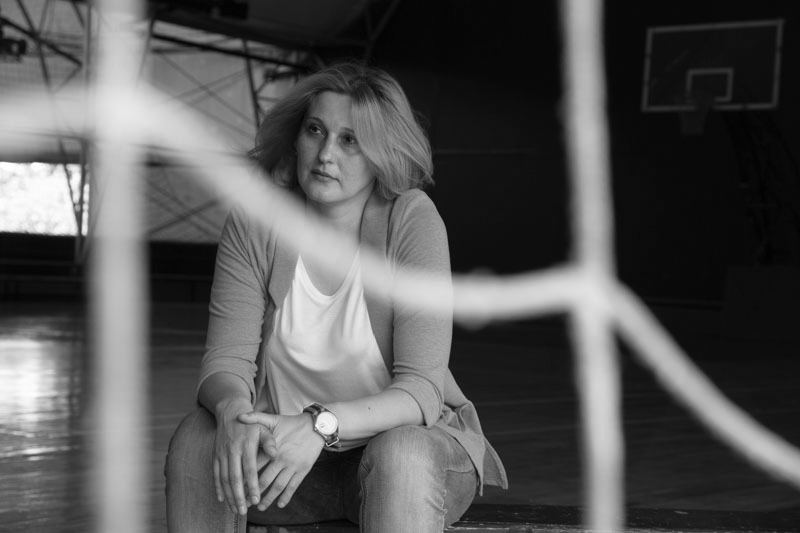
I’m not into politics. We used to knock on the door of the Provincial secretary of sport with no recommendation and we got the help we needed. She was a member of the League of Social Democrats of Vojvodina, and the current secretary is with the Progressive party, but she also offered us help. I don’t care about political parties. I think both of them are amazing.
When I come up to a woman, I’m faced with a connection. They recognize what we do and they offer help, they join us. That’s female solidarity!

Milica's questionnaire
